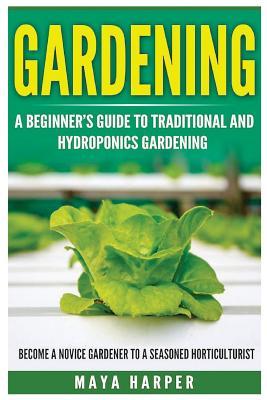Full Download Gardening: Grow Organic Vegetables, Fruits, Herbs and Spices in Your Own Home: A Beginner's Guide to Traditional and Hydroponics Gardening. Become a Novice Gardener to a Seasoned Horticulturist - Maya Harper | PDF
Related searches:
How to grow vegetables and herbs the organic way - Garden Organic
Gardening: Grow Organic Vegetables, Fruits, Herbs and Spices in Your Own Home: A Beginner's Guide to Traditional and Hydroponics Gardening. Become a Novice Gardener to a Seasoned Horticulturist
14 Do's and Don'ts of Growing an Organic Vegetable Garden
1135 94 4890 2143 2285 824 2091 3921 2525 1514 2930 3632 806 4239 3431 323 263 495 4237
To prepare your organic growing area – whether it is a pot, single bed or a large it's wise to plan your planting - making a note of what veg will grow where.
Fresh broccoli is one of the highlights of the vegetable garden, growing crisp and delicious in the chilly temperatures of early spring and fall. Broccoli is one of the most nutritious on the planet, and it's easy to grow.
If you genuinely want to grow an organic garden, it’s pretty much all or nothing. That’s because, with conventional gardening, the goal is to feed plants. When you feed soil life, the soil life then feeds the plants.
Jan 23, 2021 learn how to grow your own organic vegetables and keep your plants healthy and vigorous - from the experts at gardener's supply in vermont.
Presenting quality information to our readers is our only purpose below is the list of vegetables that can be grown in the greenhouse and what to grow in a greenhouse in summer. Easy to grow: tomatoes, strawberries, squash, beans and peas, broccoli, leafy greens such as spinach, kale, arugula, microgreens, herbs, and artichoke.
Greens: this is a wide group of veggies including mustard greens, collard greens, and turnip greens. These easy-to-grow greens are loaded with vitamins k, a, and c, manganese, fiber, and calcium, as well as a host of other vitamins and minerals.
Get practical tips on growing organic peas in the ground or in containers for your own edible landscaping. Few things say spring like that first taste of peas, picked fresh from the garden.
Building raised beds is a great way to provide your vegetables with rich organic soil to grow, and can extend the growing season significantly. The soil in raised beds will warm up earlier in the spring, and will certainly make it easier to weed and harvest than bending down to the ground.
An organic vegetable garden is free of chemicals and grows naturally, making this a healthier, safer way to grow your plants. So, how do you begin to grow your own organic vegetable garden? you start the year before. Organic gardens depend on good soil, and good soil depends on compost.
If you want to start an organic vegetable garden, select a suitable spot in your yard where you can dig a plot, build a raised bed, or set up planting containers. As your plants grow, keep them healthy with organic pest control.
Potatoes are a great crop to grow in the home vegetable garden. There is nothing better than a perfectly-boiled new potato, lightly buttered and salted.
Thanks!tried my first organic (vegan) gardening this year in organic raised beds, using miracle grow (act of desperation) organic soil, and starter plants. Very open area with good sun and lots of pollinators (bees, yellow jackets, wasps).
Perhaps the best way to do this is to start an organic vegetable garden. In fact, many people are beginning to grow their own organic food, not necessarily to save.
Gardening can be extremely enjoyable for people of all ages and different walks of life. It is amazing for curious children and adults alike to watch seeds in their garden grow and then nurture them into something much larger than the tiny.
Jan 21, 2019 do you buy organic fruits and vegetables, but wish the prices were lower? do you live in a condo, apartment or small space and yearn to grow.
An organic approach to vegetable gardening incorporates the entire garden — from the soil, seeds and plants to fertilizers and pest management — in a way that celebrates healthy foods, ultra-local growing and sustainability. All it takes is a change in perspective and some simple basics, and you're on your way to growing organically.
Check our organic gardening page for season-appropriate growing advice.
Feb 22, 2021 getting started with organic vegetable gardening can feel overwhelming, but if you are looking for an excuse to get outside and be more active,.
Learn how to grow great vegetables with our vegetable garden growing tips at howstuffworks. Advertisement a vegetable garden can be the perfect addition to your landscape.
Growing organic vegetables means your family can enjoy healthy, tasty, fresh produce free of synthetic chemicals or pesticides. Some of the organic gardening basics are the same as nonorganic. Plant in an area that gets full sun, at least 6 hours a day (8 to 10 hours is even better).
On the list of indoor plants to grow, succulents deserve a top spot because of their beauty and the ease of care. Learn how to grow a succulent garden so you can enjoy the simple delights of these low-maintenance plants.
Top 10 tips for growing organic vegetables: vegetables are sun lovers vegetables are seasonal plan staged plantings to ensure.
Many americans have taken to planting succulents in their gardens, especially in drier climates such as the south west. Succulents grow well even when the availability of water is limited.

Post Your Comments: